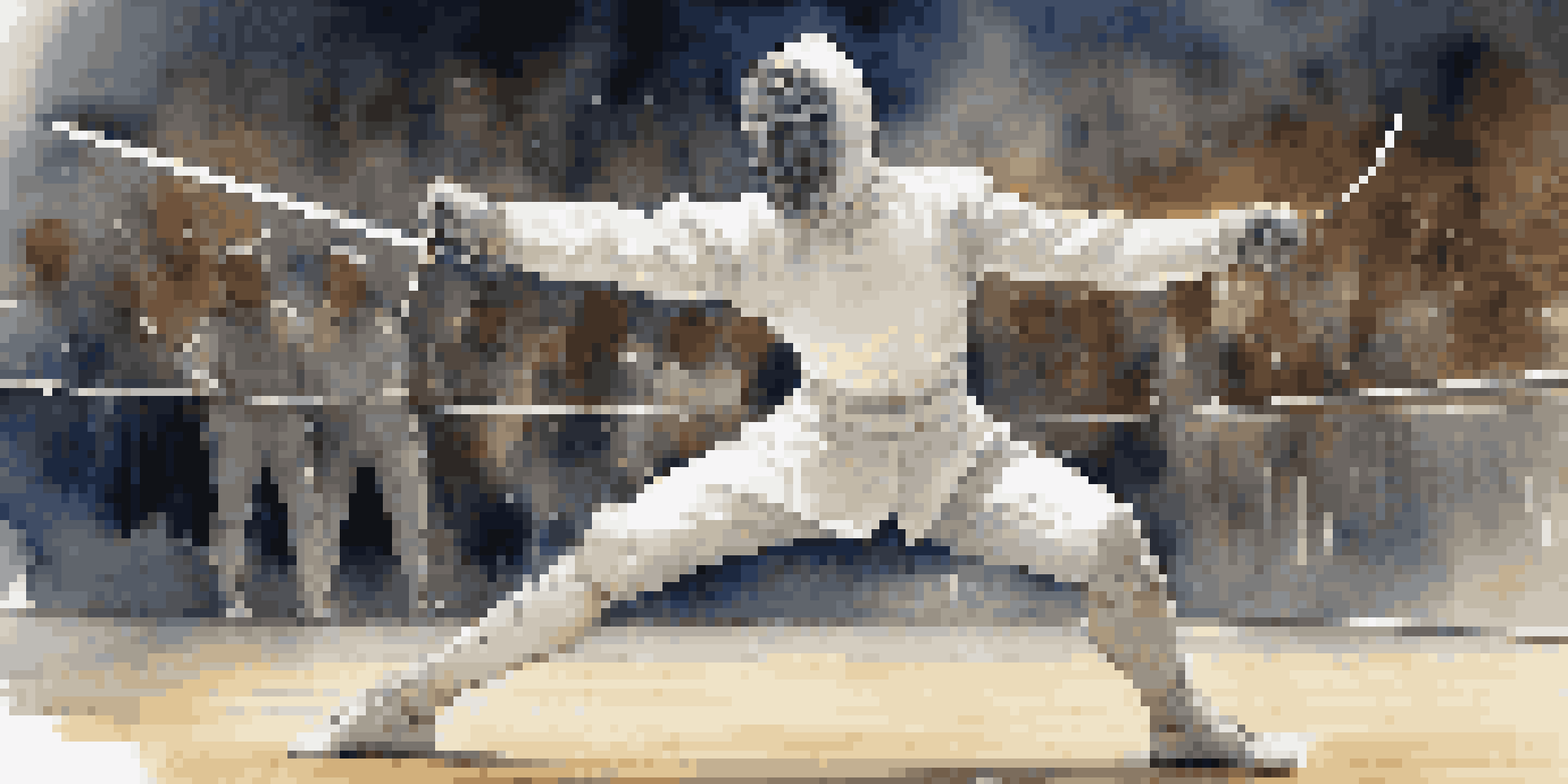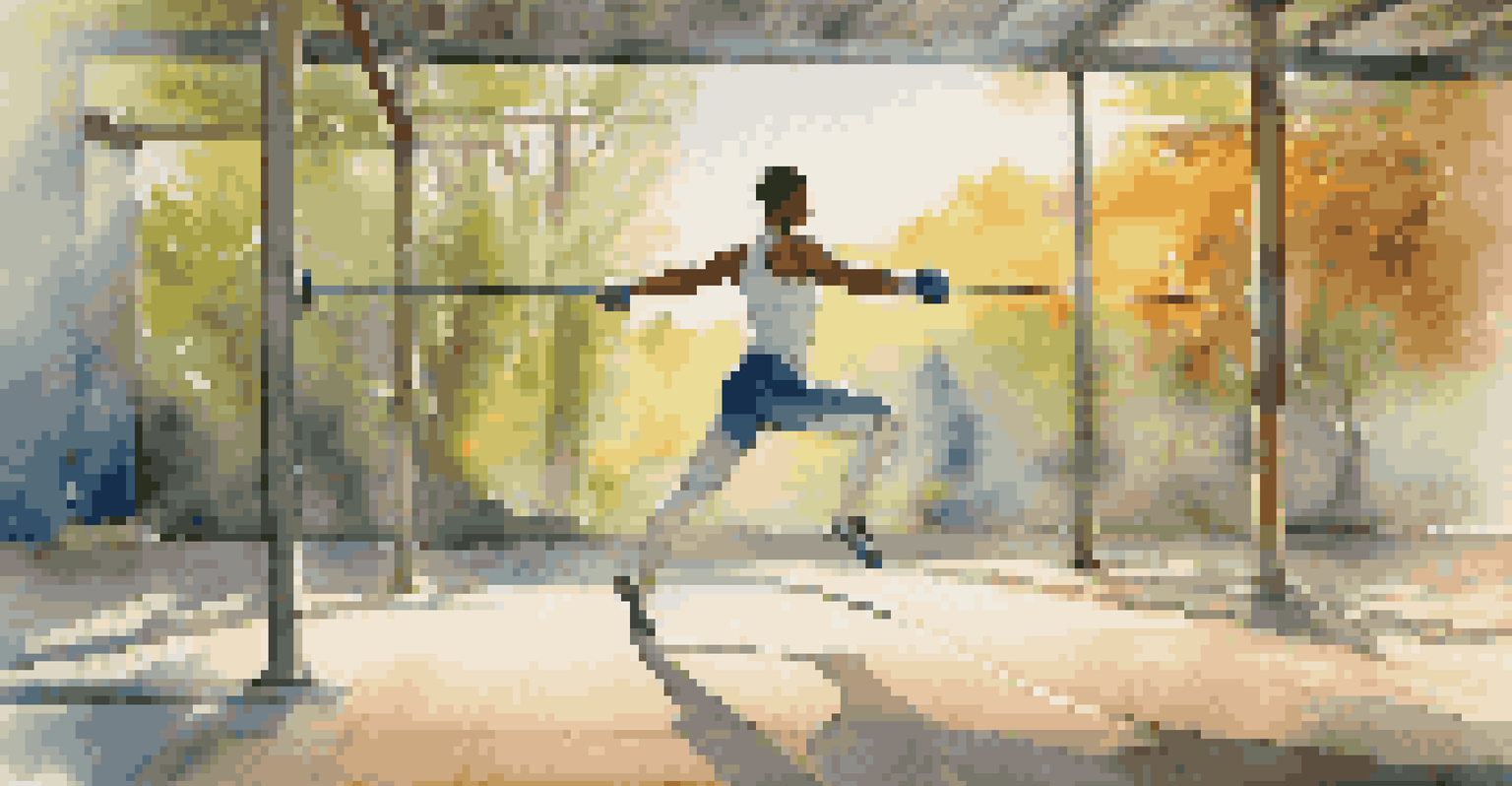Fencing and Cross-Training: Benefits from Other Sports

Understanding Cross-Training in Fencing
Cross-training involves participating in various sports to improve overall athletic performance. For fencers, this means engaging in activities outside of the fencing strip that can enhance their skills. By incorporating diverse physical disciplines, fencers can develop strength, agility, and stamina, which are crucial for success in their primary sport.
The strength of the team is each individual member. The strength of each member is the team.
Imagine a fencer who only practices fencing—while they may excel in footwork and technique, they might miss out on the benefits that other sports can provide. Cross-training can introduce new movements and challenges that keep training fresh and exciting. Additionally, it breaks the monotony, reducing the risk of burnout and injury associated with repetitive practice.
Ultimately, the goal of cross-training is to create a well-rounded athlete. This holistic approach not only builds physical capabilities but also fosters mental resilience, as athletes learn to adapt to different sports and their unique challenges.
How Strength Training Benefits Fencing Performance
Strength training is a fundamental aspect of cross-training that can significantly benefit fencers. By focusing on building muscle strength, fencers can enhance their explosive power, which is essential during quick lunges and rapid movements. Stronger muscles contribute to better control and stability when executing complex techniques.

For instance, incorporating weightlifting into a training regimen allows fencers to develop their legs, core, and upper body. Exercises like squats and deadlifts target the muscles used in fencing, improving both performance and injury resistance. Strength training not only makes fencers faster but also helps them maintain their form during prolonged bouts.
Cross-Training Enhances Fencing Skills
Engaging in diverse sports improves fencers' strength, agility, and mental resilience, ultimately enhancing their overall performance.
In essence, a well-structured strength training program can transform a fencer's abilities, leading to improved agility and endurance. The increased physicality from strength training prepares athletes for the demanding nature of fencing competitions.
The Role of Flexibility Training in Fencing
Flexibility training plays a crucial role in fencing, as it enhances an athlete's range of motion. Greater flexibility allows fencers to execute more extensive lunges and reach their opponents more effectively. This is particularly important in a sport where precision and timing can make all the difference.
Success is where preparation and opportunity meet.
Incorporating yoga or Pilates into a training routine can significantly improve flexibility. Not only do these practices increase elasticity in muscles, but they also promote mental focus and relaxation—essential elements for competitive fencers. Improved flexibility reduces the risk of injuries by helping fencers maintain proper form and alignment during intense bouts.
By prioritizing flexibility training, fencers can enhance their performance on the strip. The ability to move fluidly and react quickly to opponents' actions can set a fencer apart in high-stakes scenarios.
Cardiovascular Conditioning: A Game-Changer for Fencers
Cardiovascular conditioning is vital for fencers, as it directly affects their stamina and recovery during matches. Engaging in activities like running, cycling, or swimming can enhance overall endurance, allowing fencers to maintain peak performance throughout long bouts. A well-conditioned cardiovascular system supports quick recovery between rounds, which is crucial in tournament settings.
Consider a fencer who has incorporated interval training into their routine; this method mimics the stop-and-go nature of fencing bouts. Short bursts of intense activity followed by brief rest periods can significantly improve anaerobic capacity, equipping fencers to handle the rigorous demands of competition. This translates to greater agility and quicker response times during matches.
Strength and Endurance are Essential
Incorporating strength and endurance training into a fencer's routine boosts explosive power and stamina, leading to better competition outcomes.
Incorporating cardiovascular exercises not only improves physical fitness but also builds mental toughness. The endurance gained through consistent cardiovascular training helps fencers remain focused and composed, even in the face of fatigue.
Agility and Coordination: Key Benefits from Martial Arts
Martial arts training can significantly improve a fencer's agility and coordination. Many martial arts emphasize footwork, balance, and the ability to react quickly to an opponent's movements—skills that are directly transferable to fencing. Practicing martial arts helps fencers develop a keen sense of timing and spatial awareness.
For example, Brazilian Jiu-Jitsu focuses on body positioning and movement, which can enhance a fencer's ability to maneuver effectively during a bout. The quick reflexes and strategic thinking developed in martial arts training can give fencers a competitive edge, making them more unpredictable and versatile on the strip.
By integrating martial arts into their training, fencers can cultivate a unique skill set that enhances their performance. The combination of agility, coordination, and strategic insight can lead to more effective fencing techniques and improved match outcomes.
Endurance Sports: Building Stamina for Fencing
Endurance sports, such as long-distance running or cycling, offer significant benefits to fencers by building stamina. Fencing matches can be physically demanding, requiring sustained energy over time, especially in tournaments where multiple bouts occur. Engaging in endurance training can help fencers maintain their energy levels throughout competitions.
For instance, a fencer who regularly participates in long-distance running will develop a strong aerobic base, which supports their ability to recover quickly between bouts. This enhanced recovery translates to improved performance, as fencers can maintain their speed and agility even in later rounds of competition.
Flexibility and Agility Matter
Prioritizing flexibility and agility training allows fencers to execute precise movements and react quickly, which are crucial for success on the strip.
Incorporating endurance training not only boosts physical capacity but also instills a strong mental fortitude. The discipline required for long-distance training can help fencers stay focused and determined during challenging matches.
Mental Benefits of Cross-Training for Fencers
Cross-training in various sports provides mental benefits that are often overlooked. Engaging in different athletic activities can refresh a fencer's mind, reducing stress and preventing burnout. The diversity in training keeps the mental aspect of fencing dynamic, allowing athletes to approach their primary sport with renewed enthusiasm.
Moreover, learning new skills in other sports can boost confidence levels. A fencer who excels in another discipline may approach fencing with a more positive mindset, viewing challenges as opportunities rather than obstacles. This shift in perspective can lead to improved performance and enjoyment of the sport.

In essence, the mental benefits of cross-training are as crucial as the physical ones. Fencers who embrace a variety of sports can cultivate resilience, adaptability, and a love for their craft, ultimately enhancing their overall experience in fencing.
Creating a Balanced Cross-Training Program for Fencers
To maximize the benefits of cross-training, fencers should create a balanced training program that incorporates various activities. It's essential to blend strength training, flexibility exercises, cardiovascular conditioning, and agility drills into a cohesive routine. A well-rounded approach allows fencers to develop multiple aspects of their athleticism, making them more versatile competitors.
Planning a weekly schedule can help fencers allocate time efficiently for different training types. For example, dedicating specific days to strength training while reserving others for endurance or flexibility can ensure that all areas are addressed. This structure helps prevent overtraining in one area while allowing for adequate recovery.
Ultimately, a balanced cross-training program can lead to significant improvements in a fencer's performance. By thoughtfully integrating various sports into their training routine, fencers can sharpen their skills, enhance their physical capabilities, and enjoy their journey in the sport.